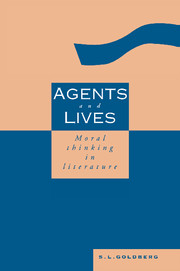Book contents
- Frontmatter
- Contents
- Acknowledgments
- Preface
- 1 ‘Perpetually moralists’ … ‘in a large sense’
- 2 ‘How to live’ and ‘how to live’
- 3 Agents and lives: making moral sense of people
- 4 ‘Doing good to others’: some reflections on Daniel Deronda
- 5 Moral thinking in The Mill on the Floss
- 6 Finding congenial matter: Pope and the art of life
- 7 Literary judgment: making moral sense of poems
- 8 Afterword: some limits of philosophy?
- Notes
- Index
1 - ‘Perpetually moralists’ … ‘in a large sense’
Published online by Cambridge University Press: 19 January 2010
- Frontmatter
- Contents
- Acknowledgments
- Preface
- 1 ‘Perpetually moralists’ … ‘in a large sense’
- 2 ‘How to live’ and ‘how to live’
- 3 Agents and lives: making moral sense of people
- 4 ‘Doing good to others’: some reflections on Daniel Deronda
- 5 Moral thinking in The Mill on the Floss
- 6 Finding congenial matter: Pope and the art of life
- 7 Literary judgment: making moral sense of poems
- 8 Afterword: some limits of philosophy?
- Notes
- Index
Summary
Various interested parties keep saying that the traditional ‘humanist’ critical study of English literature – centred on, though not of course confined to, imaginative moral understanding and literary evaluation – is on its last legs, but I very much doubt if they are right. For one thing, their conception of that tradition is little more than a caricature of its real complexity and openness; and for another, it is hard to see any of the alternatives on offer becoming popular outside the walls of academic professionalism. Admittedly, in matters like this one's reasons inevitably involve a good many calculated guesses and unverifiable judgments – moral probabilities, as they used to be called. But it seems to me that, given a reasonably free, open and cohesive society, people are more likely than not to go on being ‘humanist’, at least in the sense of being interested in people, and interested in them at least as much as in abstract theories and ideologies, or impersonal forces, or structural systems, or historical information, or even the play of signifiers. They are also more likely than not, I think, to go on wanting literature to be interested in people too, to go on valuing those writings that they judge best help them to realize what the world is and what people are, to persist in distinguishing between those ideas, utterances, fictions and texts that they believe enlighten or deepen or enrich their minds and those that do not; and also persist in thinking that this is still a good ground for preferring some books to others.
- Type
- Chapter
- Information
- Agents and Lives , pp. 1 - 35Publisher: Cambridge University PressPrint publication year: 1993



